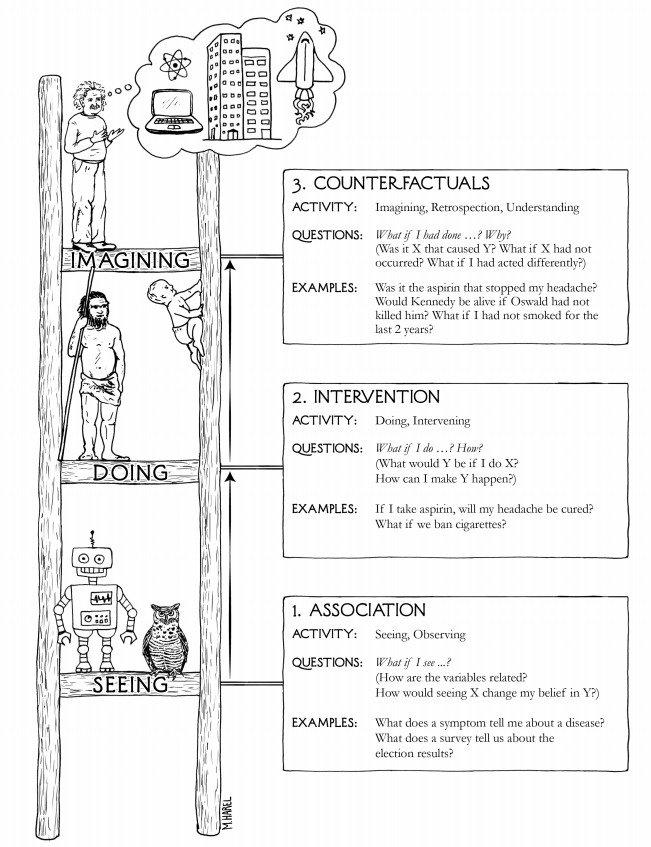I missed last week’s post to prepare for USAMO, but now we’re back! This post will hopefully bring the blog closer to emulating Astral Codex Ten, which was my original intention.
The Book of Why – Judea Pearl
I’ve been listening to The Book of Why by Judea Pearl on Audible recently, and it’s very very good. It’s not about religion at all but I understand religion a lot more now. I’ve only listened to his words for a few hours, but he’s already built up a lot of trust and influence. Now, imagine if I replaced this wise oldish man with a wise oldish priest. If you gave an intelligent adult 2 hours a week with a small child, they could totally get them to believe that a god existed. Of course, once they go to school, that kinda falls apart, but still.
Anyways, I believe that Pearl is especially convincing because his ideas are interesting and have a kernel of truth in them.
Causality
One of the key ideas in Causal Inference is the ladder of causality.

I have no intention of doing causality justice here, but a key idea is that you cannot compose actions at level 1, association, to simulate things at level 2. This is (literally) the oft-quoted mantra “correlation is not causation.”
To Read More: https://www.inference.vc/causal-inference-3-counterfactuals/
Claim
Something like “causal reasoning is a bandaid/specialized solution to our world, and that’s why there’s no mathematical basis for causation (w/o interventions – lvl2, or counterfactuals – lvl3)”
Problem of Induction + SF
Most of what I know about this is from https://www.youtube.com/watch?v=r3QZ2Ko-FOg and skimming the Wikipedia page. Humes’s ideas are really cool though, and you can see them pop up in a lot of sci-fi. It’s kinda like how getting surprising results in Elliptical/Hyperbolic (non-Euclidean) geometry is much easier than in Euclidean Geometry. Writing sci-fi on the basis of empiricism makes appearing novel easier because the foundational principles are so different.
Here’s how Wikipedia defines the Problem of Induction, the thing that’s relevant here.
1. Generalizing about the properties of a class of objects based on some number of observations of particular instances of that class (e.g., the inference that “all swans we have seen are white, and, therefore, all swans are white”, before the discovery of black swans) or
2. Presupposing that a sequence of events in the future will occur as it always has in the past (e.g., that the laws of physics will hold as they have always been observed to hold). Hume called this the principle of uniformity of nature.[2]
https://en.wikipedia.org/wiki/Problem_of_induction
A good example of this is a quote from the first book of the TBP trilogy.
“In the shooter hypothesis, a good marksman shoots at a target, creating a hole every ten centimeters. Now suppose the surface of the target is inhabited by intelligent, two-dimensional creatures. Their scientists, after observing the universe, discover a great law: “There exists a hole in the universe every ten centimeters.” They have mistaken the result of the marksman’s momentary whim for an unalterable law of the universe. The farmer hypothesis, on the other hand, has the flavor of a horror story: Every morning on a turkey farm, the farmer comes to feed the turkeys. A scientist turkey, having observed this pattern to hold without change for almost a year, makes the following discovery: “Every morning at eleven, food arrives.” On the morning of Thanksgiving, the scientist announces this law to the other turkeys. But that morning at eleven, food doesn’t arrive; instead, the farmer comes and kills the entire flock.”
Page 74 of The Three Body Problem
Bringing it All Together
I hope this is enough background, but there’s a connection I’m trying to point out here between the Shooter-Farmer hypotheses, Causality, and the Problem of Induction. I wonder if human causal reasoning, the understanding that the apple falls because of gravity, is all a mistake.
My olympiad fakesolve spidey-sense tells me that getting to levels 2 and 3 in the ladder of causation is suspect due to the Problem of Induction. Perhaps the laws of physics do not exist and are merely small patterns caused by one of the Shooter-Farmer hypotheses in our small window of space-time. Then, our minds manage to create models that seem to work, but the problem of induction exists because these things are not truly universal.
It’s About Time
Causality’s traditional foundation is time, which feels rock solid. It cannot have been that the smoke I see right now caused the fire which happened a minute ago, or is it? I plan on looking into a bit more about general relativity, I remember there being some metric with spatial dimensions being weighted positively and time being weighted negatively, but I can’t find it now. The closest thing I can find is://en.wikipedia.org/wiki/Metric_tensor_(general_relativity).
Anyways, I have very smart friends, so I wouldn’t be surprised if they pointed out mistakes in my reasoning.
Looking Forward
I’m probably going to try to write up book reviews of Dark Forest and Death’s End. (I’ve submitted a review of the first book to The Choate News) I also think it would be valuable to write up chapter by chapter summaries of the Book of Why, but I’m limited by my lack of access to a physical copy. My main goal I to read the ten papers in https://blog.crossminds.ai/post/must-read-ai-papers-neural-networks-computer-vision-deep-learning-nlp-machine-learning by the end of the week to get a more broad foundation in ML.